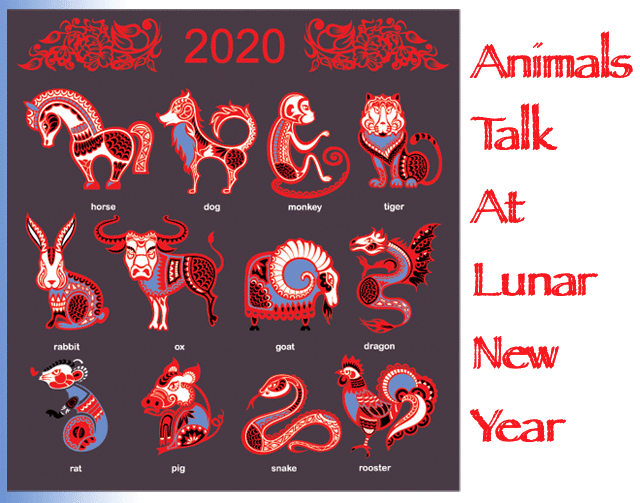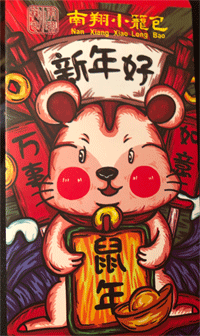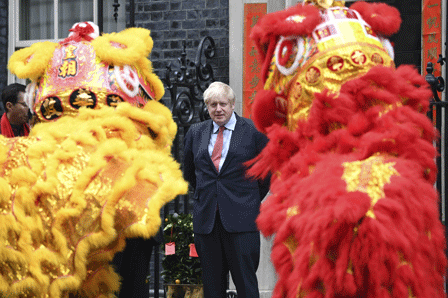 |
Chinese New Year, also known as Lunar New
Year and Spring Festival (to be inclusive of the East Asian diaspora that
is not Chinese) began on January 25, 2020. It is the year of the Rat.
The Rat occupies the first position in the Chinese zodiac. The story of
how he earned that position has many versions, but they all center around
a mythical race hosted by the Jade Emperor. The Jade Emperor, ruler of
all the gods of Chinese mythology, desired 12 guards and decreed that
the first 12 animals to pass through the Heavenly Gate would form his
regiment.
 In most retellings, the race involves crossing
a river. The Rat, who was not a very good swimmer, knew that he would
never come in first without a little help. The other animals had strengths
that ensured good finishing placements. The Ox was strong and industrious,
the Tiger and the Rabbit were fast, the Dragon could fly. The Rat knew
that, in all likelihood, he would drown before he reached the other side.
However, the Rat was quick witted and cunning—smarter than many
of his compatriots. He was also a devout early riser. On the day of the
race, the Rat got up very early and asked the Ox if he wouldn’t
mind a companion as they crossed the river. With his smarts and the Ox’s
strength, he assured, they would certainly finish in the top. The Ox,
ever obliging, kind, and trustworthy, saw no reason to deny the small
animal a little help. The Rat hitched a ride in the Ox’s ear, far
above the raging water, and glided safely across the river. As they neared
the far bank, the Rat jumped from the Ox’s ear, landing at the feet
of the Jade Emperor and securing his first-place position. The Ox wasn’t
too pleased to have the first position stolen, but he was the Ox. He took
it in good stride. In most retellings, the race involves crossing
a river. The Rat, who was not a very good swimmer, knew that he would
never come in first without a little help. The other animals had strengths
that ensured good finishing placements. The Ox was strong and industrious,
the Tiger and the Rabbit were fast, the Dragon could fly. The Rat knew
that, in all likelihood, he would drown before he reached the other side.
However, the Rat was quick witted and cunning—smarter than many
of his compatriots. He was also a devout early riser. On the day of the
race, the Rat got up very early and asked the Ox if he wouldn’t
mind a companion as they crossed the river. With his smarts and the Ox’s
strength, he assured, they would certainly finish in the top. The Ox,
ever obliging, kind, and trustworthy, saw no reason to deny the small
animal a little help. The Rat hitched a ride in the Ox’s ear, far
above the raging water, and glided safely across the river. As they neared
the far bank, the Rat jumped from the Ox’s ear, landing at the feet
of the Jade Emperor and securing his first-place position. The Ox wasn’t
too pleased to have the first position stolen, but he was the Ox. He took
it in good stride.
There is one animal conspicuously missing
from the Chinese zodiac: the Cat. The Cat and the Rat, both possessed
of a superior intelligence, were very good friends at the time. There
are two versions of the story—both involve deception, though one
seems intentional while the other seems less pointed. In the first version,
the Cat asks his best friend the Rat to wake him up for the race. The
Cat is a notorious late sleeper. Unfortunately, the Rat forgets to wake
his friend, and the Cat misses the race entirely. In the other version,
both the Rat and the Cat strategize riding the Ox across the river because
they know they will drown otherwise. As they reach the far shore, the
Rat pushes the Cat into the river. The Cat drowns, and the feline fear
of water is born. Both versions secure the Cat as the eternal enemy of
the Rat owing to this first broken trust.
 UK
Prime Minister Boris Johnson celebrates Lunar New Year at 10 Downing Street. UK
Prime Minister Boris Johnson celebrates Lunar New Year at 10 Downing Street.
It’s an amusing story, but I don’t
recommend modeling your 2020 after the Rat. Don’t deceive your friends.
Be an early riser, but don’t take advantage of your most steadfast,
reliable compatriots. If they help you achieve something significant this
year, acknowledgment of their assistance is an objectively better move
than snatching any accolades they might earn. Being cunning is a virtue,
but so is being genuine and dependable. There’s something to be
said for the animals who ended the race in the latter placements. The
dragon, who should have come in first place given he could have simply
flown over the river, only came in fifth—he stopped to help douse
the flames of a village on fire. The dog, who came in second to last place,
was distracted by how much he enjoyed his swim, having not had a bath
in quite some time. The pig, who came in dead last, was very hungry, stopped
to eat and then, drowsy with food, took a nap. I can respect that.
There are many traditions and taboos around
Lunar New Year. You may not believe in such things. The power of intention,
and moving through your life with intention, should be considered. Infusing
your actions with meaning is a little like adding healthy spices to your
food. Maybe turmeric doesn’t help with inflammation, perhaps cumin
can’t lower cholesterol, but if the food tastes better for it, why
not? Placebos have power. If you believe it, that belief will empower
your attitude and actions. It can’t hurt. A few rituals to remember
as you move through Lunar New Year:
1. Try to clean before, not during, the new year. You’re not
just sweeping dust out of your home—you could also sweep away your
good fortune.
2.
Don’t cut your hair until the new year is
over. As with cleaning, you don’t want to cut short your luck or
success for the year. By that same token, don’t wash your hair or
your clothes on the first day of the Lunar New Year unless you want to
see your good luck go down the drain.
3.
Only use positive words. Any negative words will
linger for the rest of the year. This is sound advice in general.
4.
It might be cold out, and oatmeal might be healthy,
but skip the porridge on the first day of Lunar New Year. Eating porridge
will bring poverty in the new year. Porridge is delicious but use this
as an excuse to eat a large, hearty breakfast that morning. Pancakes are
great. Skip the bacon, though, out of respect for the vegetarian Buddhist
gods.
5.
Wear bright clothes. No black or white, which symbolize
death. Red is preferred. Make sure your clothes aren’t raggedy,
as that courts poverty.
6. Crying is believed to bring bad luck, so try not
to cry. There’s no crying in Lunar Festival.
 7.
Try not to borrow money, and if you’ve lent
someone money, don’t collect it during Lunar New Year. It is believed
it will bring bad luck. 7.
Try not to borrow money, and if you’ve lent
someone money, don’t collect it during Lunar New Year. It is believed
it will bring bad luck.
Do spend time with your
family. Share a meal with loved ones—fish increases prosperity,
dumplings ensure great wealth, and rice cakes encourage a higher income
or better position at work. For the record, when you say kung hei fat
choi you’re wishing for someone to have a happy, prosperous year.
It’s common in formal situations, especially in the workplace. If
you’d like to say Happy New Year to a stranger or acquaintance,
say Xin nián kuài lè (Shin nee-yen kwai ler); with
friends and family, shorten the greeting to Xi¯n nián hao
(Shin nee-yen haow). You can learn more customary greetings here.
Flossie |




 Vol.
19 No. 3
Vol.
19 No. 3